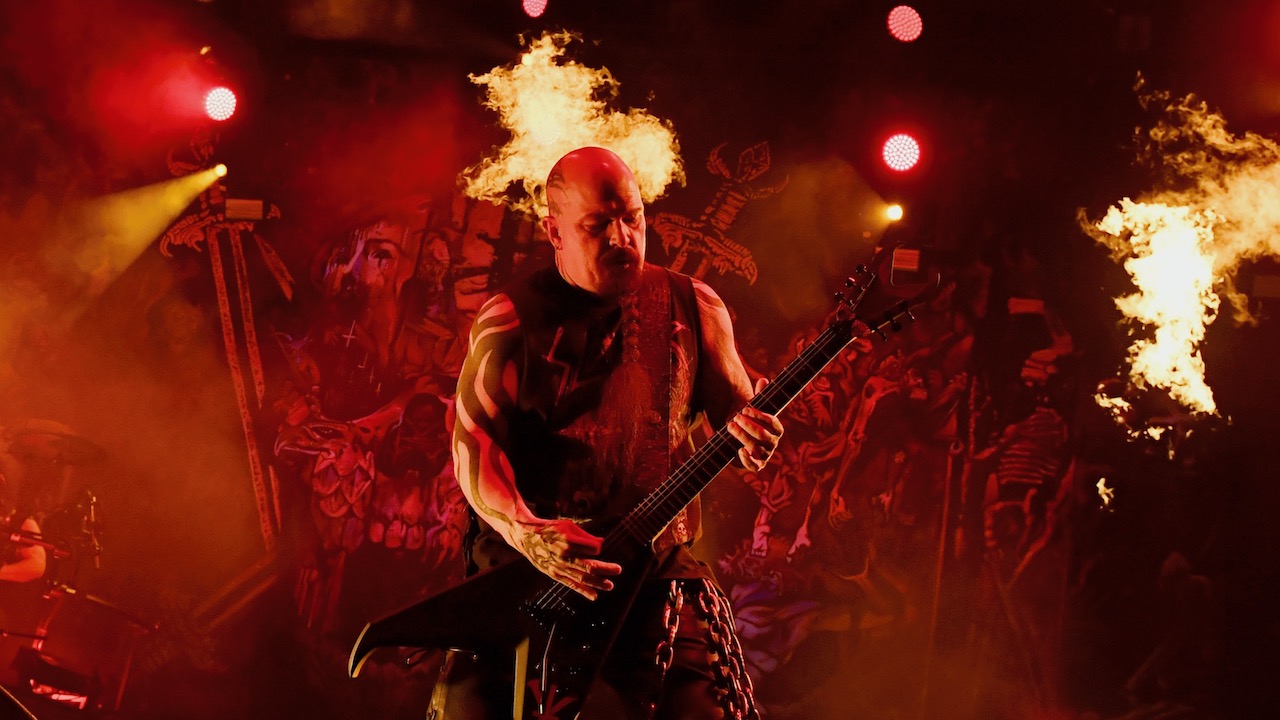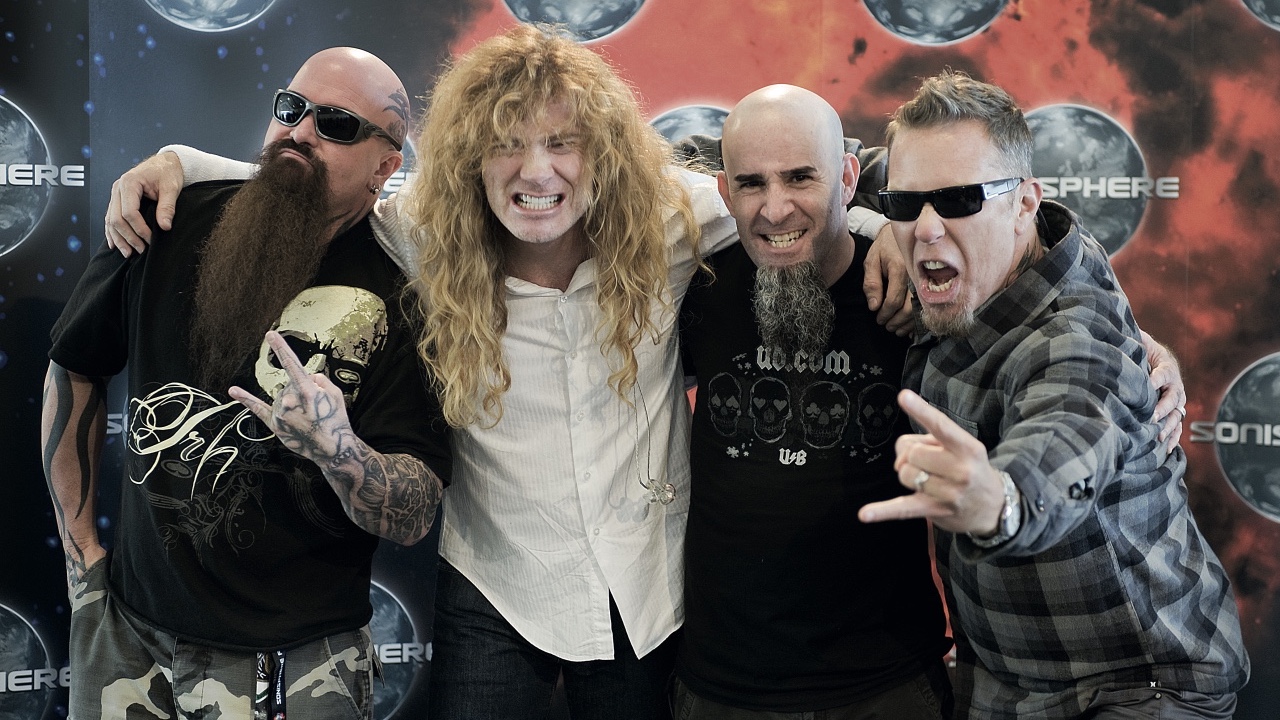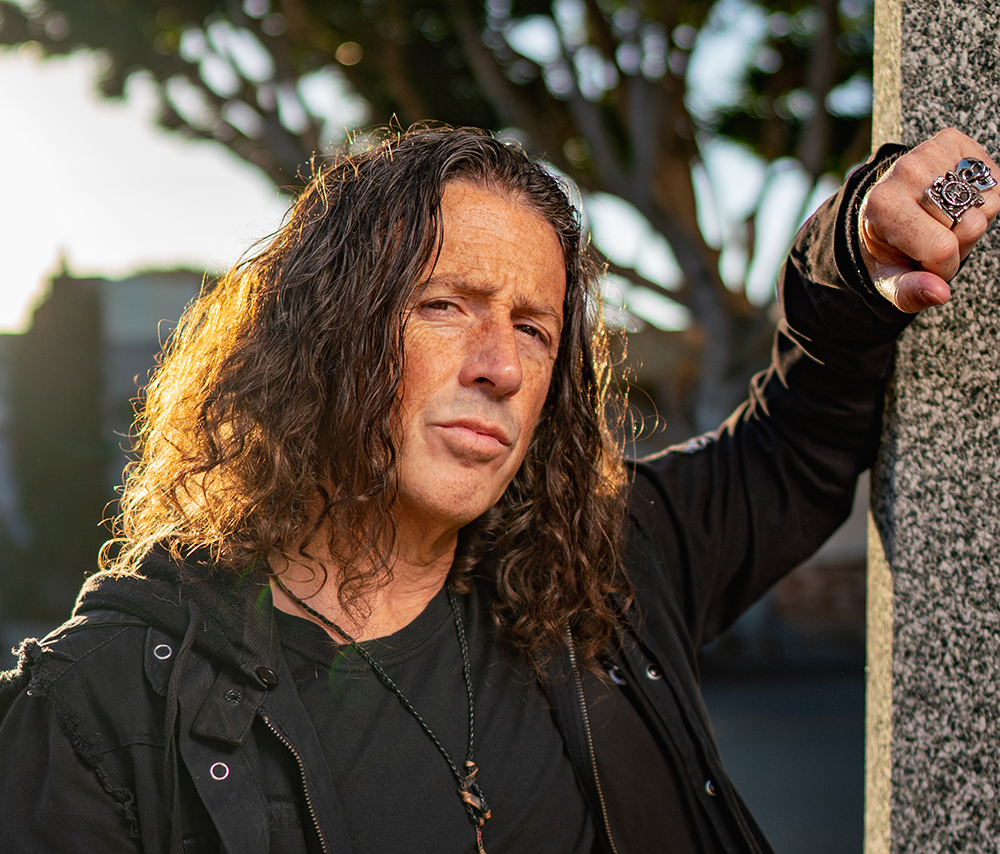Before entering the history books as half of thrash metal’s famed Big Four, Metallica and Slayer were a pair of feisty young upstarts, slogging it out on the Orange County club circuit, united in their disdain for hair metal and their commitment to making the fastest, heaviest music that the world had ever known.
Slayer’s Kerry King looks back on those early days, and Metallica’s rise to the top of the heavy metal pantheon.

When did you first meet Metallica?
“I saw them in the Woodstock [The Woodstock Concert Theatre in Anaheim, California] before they were a Bay Area band. I saw them play with Dave Mustaine – that’s how long we’re talking about. Actually meeting the dudes? I don’t know. But we did play with them a time or two before they went to the Bay Area.”
What were your first impressions?
“I liked it. I like speed metal or thrash metal – which hadn’t been named yet – which is what they were to me. I liked what they were doing with it and I was already into Venom. I’ve always been a big Venom fan, and I think that a cross between Venom, Judas Priest and Metallica kind of made Slayer what Slayer is.”
In the 80s, the hair metal scene in Los Angeles was notoriously cut- throat. Was it the same situation in Orange County?
“I don’t think so. I obviously can’t speak for Metallica, but they probably avoided Hollywood as much as we did, because that was glam central. Orange County, where I’d seen them play, that’s where a ton of heavier bands and punkier bands came from. So I think, rather than them being competition at that point, we were all competing against glam.”
In 1984, you briefly played with Megadeth. Did you have any sense then that Dave Mustaine was resentful towards Metallica?
“Probably. But I looked up to Mustaine ever since he was in Metallica. I was in the crowd with Jeff [Hanneman, Slayer’s late lead guitarist] actually, saying, ‘Look at that dude! He’s just ripping up there!’ He’s got a great style and in the beginning, it helped Metallica become what Metallica is. And let me tell you something – to this day, he’s a great guitar player.
"But yeah, I played five shows and then Dave wanted me to stay around, but I didn’t have any reason to stay around because I had Slayer. I remember having a conversation with him and saying like, ‘Yeah, but we have all this dark stuff’, and Mustaine saying something like, ‘Well, we’ve got this song, it’s pretty Satanic,’ and I was like, ‘At the end of the day, dude, it ain’t about that. I came to play with you. I think it went spectacularly well but it’s time for me to get back to my band.’”
What do you reckon is the biggest factor in Metallica’s success?
“They were probably the best with melody, be it vocal or guitar harmonies. Sure, we had guitar harmonies but they were still on the darker side, whereas with Metallica, it was more – I don’t want to cheapen it by saying this – but it’s more everyman’s music.
"Like I said, I don’t mean that in a cheap way; it’s easier to get into for people than Slayer’s darker tones and darker lyrical vision. Metallica wrote stuff that anybody could like without going, ‘Why am I liking this?’ or, ‘Is it OK to like this?’ Whereas people have probably asked themselves about us for decades, ‘Is it OK to like Slayer?’ Ha ha!”

What was your reaction to The Black Album?
“I may not have been super-stoked on it, but I never hated it the way a lot of people did. To this day, I like that record a lot. I think it’s Metallica but I don’t think it’s thrash Metallica. You can hear where all the influences come from, from all of their older stuff. They just super-slowed it down and made it super-heavy; they made it super-catchy.
"That record probably sold more than all of my records, combined! Ha ha ha! There was so much grief over that when it came out. And to be honest with you, everything that came out after that for a long time, that’s what I have a problem with. But The Black Album? It’s still heavy. It’s got some fast stuff on it.”
The first Big 4 show happened in Poland, in 2010. The day before that show, there was a famous roll call photo taken of all of the musicians. What was the vibe like?
“It was cool. The Metallica quotient was weird for me because, even then, they were bigger than everybody. But we ran in very different circles. Unless we ran into them at a European festival somewhere, we didn’t see them very often. I know the photo you’re talking about and at that point I thought, ‘This will be really cool for the fans.’ By the end of that first show I thought, ‘You know what? That was cool for me, too.’”
What do you remember about those shows?
“Just that we loaded our set. It’s hard to say ‘loaded our set’, because we only played eight or nine songs, but we played some heavy, heavy hitters. Just because we hadn’t played with Metallica since the early 80s! We wanted to make a great showing and we went out there, guns fucking blazing. And we had great shows. We wanted to make ourselves seen doing what we do best, and set the stage for Metallica, because they’re coming out after Slayer and they’re going to be playing some heavy hitters, too.”
What’s Metallica’s greatest accomplishment?
“Man, they’ve had so many. One that I can say we were a part of was the Big 4 show at [New York’s] Yankee Stadium. I think we were the first musical concert at the new Yankee Stadium and I think that was big for Metallica, so I’m happy to be a part of that with them. But their greatest achievement, I would say, has got to be The Black Album. That’s the biggest level of success for them. It may not be my thing, but it’s the first thing that comes to mind.”
Would Slayer ever do a Big 4 if they did it again?
“I would! But the way that I’m moving forward is I don’t think Slayer are ever going to play again. There’s no business of me playing by myself! Ha ha!”
Interview originally from Metal Hammer 355, out now. Order your copy here

